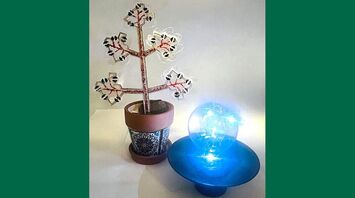Researchers create artificial plants that purify indoor air, generate electricity

Binghamton University researchers, Professor Seokheun "Sean" Choi and Ph.D. student Maryam Rezaie, are exploring a novel application of their work on bacteria-powered biobatteries to create artificial plants that purify air and generate electricity. Considering that Americans spend around 90% of their time indoors where air quality significantly impacts health, the pair aim to address the challenges of traditional air purification systems, which are often expensive, inconvenient, and maintenance-intensive.
Choi and Rezaie envisioned artificial plants that utilize photosynthetic bacteria and biological solar cells to absorb carbon dioxide, emit oxygen, and produce a modest amount of power. Their results, partially funded by the Office of Naval Research, have been published in Advanced Sustainable Systems. As Choi emphasized, "COVID-19 underscored the importance of indoor air quality, given how factors like building materials and even cooking can heighten carbon dioxide levels."
The prototype—an artificial leaf with a five-leaf structure—though it currently generates only about 140 microwatts of electricity, suggests much potential. With improvements, Choi envisages tapping into these plants to supply power for small electronic devices, leveraging systems like lithium-ion batteries for energy storage.
Anticipated upgrades might include diverse bacteria species for increased sustainability and reduced maintenance systems for water and nutrients, facilitating their widespread domestic use. As the technology evolves, Choi believes these artificial plants could benefit households immensely, emphasizing their practicality and potential uplift in fostering healthy indoor environments.
Earlier, SSP wrote about Pika 1.5: advanced AI model for ultra-realistic video generation.



















